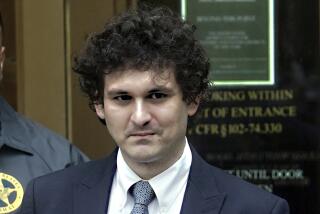4 Charged With Insider Trading in B of A Merger
- Share via
WASHINGTON — The Securities and Exchange Commission on Thursday charged two former Treasury employees and two others with using confidential information about BankAmerica Corp.’s merger with Security Pacific Corp. to make more than $155,000 in stock market profits.
The two former employees of the Treasury’s Office of the Comptroller of the Currency--computer expert John Acree, 43, and analyst John Flattery, 31--also allegedly made $15,000 using a secret report showing problems at the Shawmut National Bank in New England.
The news was a blow to the closed world of federal financial regulation, where government employees have had a virtually spotless record of keeping secrets about the financial health of banks and savings and loan associations.
“It is important to let the public know that this type of conduct . . . by public officials is subject to the same scrutiny as corporate officials,” said Bruce Hiler, associate director of enforcement for the SEC.
The charges, made in a civil suit filed in federal court here, mark the first time that Treasury officials have been charged with insider trading. The OCC regulates nationally chartered banks for the Treasury.
The SEC also made charges of insider trading against Stephen Lane, 39, a former OCC employee and an executive of Secura Group, a bank consulting firm, and Robert Bolton Jr., 35, an Arlington, Va., diner owner. The two were friends of Acree and Flattery.
The SEC is seeking forfeiture of the defendants’ alleged illegal profits, civil penalties and injunctions against future violation of federal securities laws.
Flattery was a financial analyst at the OCC’s multinational banking department and Acree was a computer specialist in 1990 and 1991 when the alleged violations of securities law took place. Acree and Flattery learned about the proposed bank merger in August, 1991, before it was announced publicly, the suit said. They bought stock in both BankAmerica and Security Pacific and also purchased call options, which are, in effect, a bet that the shares will rise.
They shared the news with Lane. The four men and another unnamed individual “reaped profits in excess of $155,000,” the SEC said.
In January, 1990, Acree learned of adverse information in a bank examiner’s report of Shawmut. He and Bolton used the information to trade “put” options on the bank’s stock, a bet that the shares would fall in price. They made gross profits of more than $15,000, the SEC said.
Steinbrink said the OCC learned of Acree’s possible involvement in September, 1991, and placed him on leave. He was fired in February and is appealing his dismissal. Flattery was placed on leave in October and resigned in January.
Attorneys for Acree, Flattery and Bolton declined comment on the charges. Henry Asbill, a lawyer for Lane, said the SEC’s allegations “are lies and false.” Lane “didn’t engage in any insider trading, and didn’t knowingly receive any inside information or pass on any inside information to anyone else,” Asbill said.
The insider trading charges erupted despite extraordinary measures that kept the BankAmerica-Security Pacific merger secret until it was disclosed publicly on Aug. 12 of last year. The blockbuster announcement was a complete surprise to the banking industry and Wall Street, which had been expecting a merger between Security Pacific and Wells Fargo.
Only a handful of the nation’s most senior regulators were briefed in advance of the merger by top BankAmerica officers, and only a small circle of bank executives were aware that negotiations were taking place.
Rosenblatt reported from Washington and Bates from Los Angeles.
More to Read
Inside the business of entertainment
The Wide Shot brings you news, analysis and insights on everything from streaming wars to production — and what it all means for the future.
You may occasionally receive promotional content from the Los Angeles Times.










